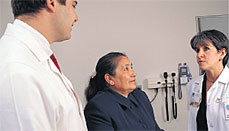
|
Joana Seidner (right),
a senior medical interpreter, facilitates communication
between Dr. Paolo Hoff and patient Maura Campos, who speaks
Spanish.
|
|
 he
M. D. Anderson community of patients, faculty and staff represents
an astonishing diversity of culture and language. International patients
make up more than six percent of those treated at the cancer center
every year. he
M. D. Anderson community of patients, faculty and staff represents
an astonishing diversity of culture and language. International patients
make up more than six percent of those treated at the cancer center
every year.
 While
the foremost challenge for all is to conquer cancer, for some there
is another, perhaps less obvious, challenge — the language
barrier. To help overcome this barrier, medical interpreters are
dedicated to facilitating communication between patients and their
health care professionals. While
the foremost challenge for all is to conquer cancer, for some there
is another, perhaps less obvious, challenge — the language
barrier. To help overcome this barrier, medical interpreters are
dedicated to facilitating communication between patients and their
health care professionals.
 Language
Assistance interpreters speak Spanish, Arabic, Portuguese, Turkish,
Vietnamese, Mandarin, Taiwanese, Italian, Japanese, German, French
and Danish. Interpreters for other languages, including sign language,
are contracted through language agencies. Language
Assistance interpreters speak Spanish, Arabic, Portuguese, Turkish,
Vietnamese, Mandarin, Taiwanese, Italian, Japanese, German, French
and Danish. Interpreters for other languages, including sign language,
are contracted through language agencies.
 “We
help patients act and interact as autonomous persons who are full
participants in their cancer care and who can make informed decisions,”
says medical interpreter Fuad Yahya. “We
help patients act and interact as autonomous persons who are full
participants in their cancer care and who can make informed decisions,”
says medical interpreter Fuad Yahya.
 Fuad,
who is from Qatif, Saudia Arabia, says that when physicians communicate
freely and directly with their patients — which is what medical
interpreting is supposed to facilitate — the patients are more
willing to entrust their lives to the physicians’ care. Fuad,
who is from Qatif, Saudia Arabia, says that when physicians communicate
freely and directly with their patients — which is what medical
interpreting is supposed to facilitate — the patients are more
willing to entrust their lives to the physicians’ care.
 “Interpreters
have an obligation to faithfully transmit all stated information,
even though some of it may be unpleasant. Withholding vital information
from patients for the sake of sparing them the burden of knowledge
invariably undermines trust,” Fuad says. “Interpreters
have an obligation to faithfully transmit all stated information,
even though some of it may be unpleasant. Withholding vital information
from patients for the sake of sparing them the burden of knowledge
invariably undermines trust,” Fuad says.
 Language
Assistance also has a team of interpreters who are charged with
producing patient education materials in their languages. Language
Assistance also has a team of interpreters who are charged with
producing patient education materials in their languages.
|

